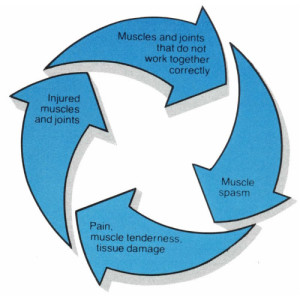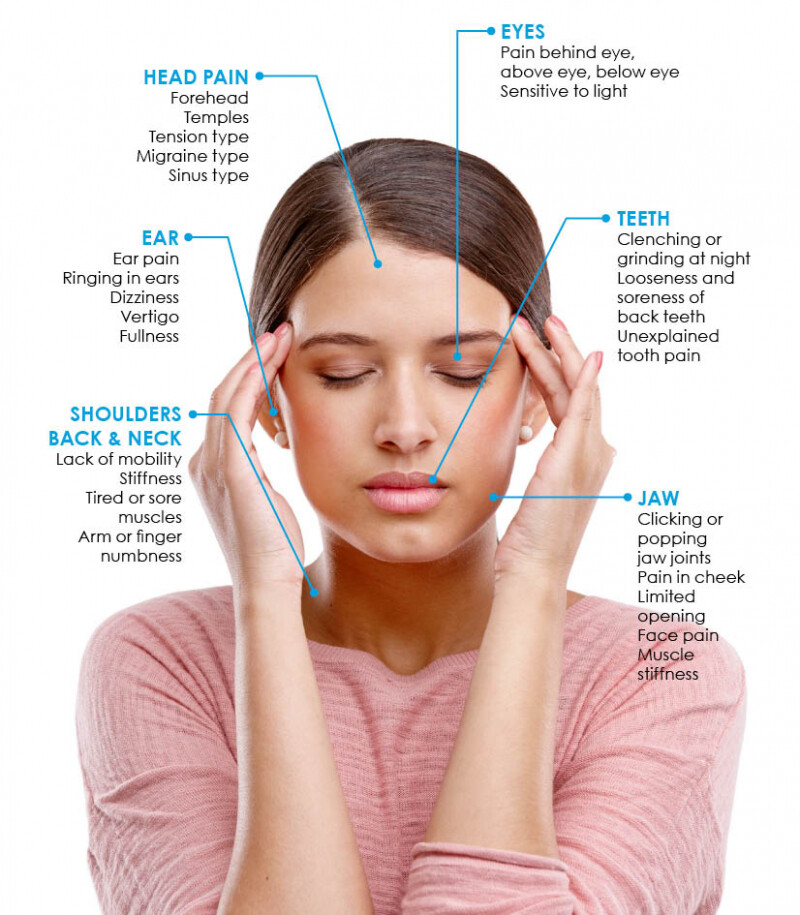

So What is TMJ?
TMJ is an acronym for the Temporomandibular Joints (TMJ)--- the joints that connect your jaw to your skull. These two joints are the hinges that allows you to open and close your mouth. Although it seems that most of the movement is at the mouth, these joints actually internally slide and rotate in front of your ears. When the joints and surrounding muscles are out of harmony, it creates uncomfortable symptoms it is known as Temporomandibular Disorder (TMD).
Because there are several structures involved in TMD (the joints, the bones, muscles, and teeth), symptoms can vary significantly. TMJ and TMD symptoms are not always the same in every patient and can even change day to day in the same person. To simplify your understanding of TMD symptoms, we can group TMJ and TMD into three separate categories:
-
Myofascial pain - This is the most common form of TMD. The patient experiences discomfort or pain in the muscles that control the jaw function, the neck, or the shoulder muscles. Common complaints are muscle fatigue when chewing or talking, clenching or grinding the teeth, headaches, ringing in the ears, or earaches.
-
Internal derangement of the joint – This means there is a dislocation of the jaw joint, displaced disc, or injury to the rounded edges of the jaw. This often happens from injury or excessive fatigue or stress.
-
Degenerative joint disease – This is the least common of TMD disorders. Patients can develop osteoporosis or rheumatoid arthritis in the jaw joint just as happens in other joints.
It is also important to note that a patient may, unfortunately, have one or more of these conditions at the same time.
What causes TMJ and TMD?
There are many factors that are linked and often accompany TMJ and TMD conditions. Some have a cause and effect relationship, and some of these factors are frequently observed in patients that are suffering from TMD symptoms.

What are TMJ symptoms?
TMJ symptoms can be highly varied, which can lead to misdiagnosis since not all of the symptoms are localized to the jaw. The most common symptoms of TMJ and TMD pain that patients complain of include:
-
Muscle fatigue when eating
-
Chronic headaches or migraines
-
Neck and shoulder pain
-
Diffuse pain along the sides of the face
-
Ringing in the ears
-
Teeth clenching or grinding
-
Pain when biting directly on back molars
-
Eye pressure
-
Lockjaw
Many people suffering from TMJ receive conflicting recommendations and advice. They do not know whether to see a physician, dentist, physical therapist, psychologist, surgeon, or chiropractor. Patients often live on painkillers, and attempt jaw stretches to try to relieve the pain. While these treatments may work temporarily to relieve TMJ and TMD pain, they do not correct the root cause. Working with a neuromuscular dentist that understands the entire spectrum of TMD symptoms and all treatments is the best way to permanently resolve TMD symptoms.
We're not the only TMJ Treatment. We're the best to start healing.
Treatment for TMJ is complex. It is customized based on the patient's symptoms. Treatment can involve a number of different approaches, depending on what's causing your TMD disharmony. Some of the most common treatment approaches are:
TMJ Mouthguard: A customized orthotic night guard positions the jaw in a stable position that allows the muscles and joints to heal. Think of an occlusal orthotic similar to a cast for a broken bone. You may need to wear the orthotic only at night or 24/7. We often use the orthotic as a test for a period of time to work out the position the jaw is most comfortable. Once symptoms have stabilized, the goal is to realign the bite with orthodontics or with occlusal equilibration to allow the patient to be comfortable without wearing the orthotic. TMJ Relax most closely falls in this area of treatment.
Orthodontics: The alignment of how the top and bottom teeth occlude together has a large effect on the tension of the muscles and the stress placed on the TMJ. Orthodontics are often recommended to place the top and bottom jaws in a more harmonious relationship that place less tension on the muscles.
Restorative Dental Treatment: Severely worn or broken teeth create uneven forces on the bite and jaws. In cases where the teeth are creating uneven force dental crowns, bridges, implants, or composite fillings may be recommended to rebalance and stabilize the bite.
Occlusal Equilibration: When the teeth of the top jaw contact the lower jaw in unbalanced force it leads to the patient grinding and clenching as they subconsciously search for the proper bite position. This muscle activity creates fatigue. When bite forces and bite interferences of the teeth are a factor, we may recommend an occlusal equilibration using computer T-scan technology. The procedure allows the bite forces to be equally distributed and eliminates interferences of side to side motion. Reducing bite interferes reduces muscle fatigue.
Trigger point injections: Muscles that are overly developed can overpower other components of the TMJ complex. When some muscles are identified as being excessively overpowering TMJ dentists may consider injections to reduce the overcompensating muscles which ultimately reduces the tension and pain.
